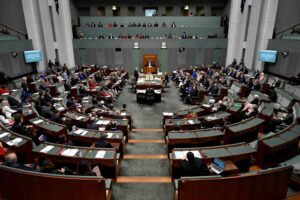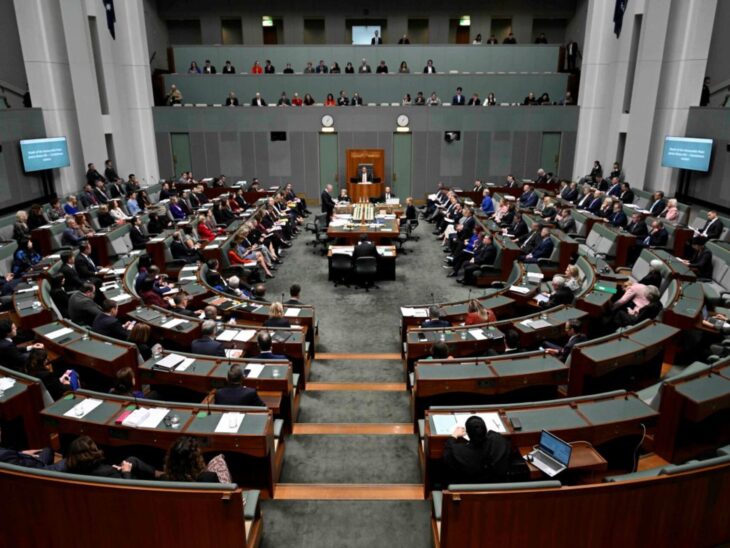

IPU looks at how the Australian Parliament is transforming its workplace culture
Parliament House is not only the heart of Australia’s parliamentary democracy, it is also the most high-profile workplace in the country. So when accounts of sexual assault, harassment and bullying in the Parliament emerged in 2020, there was no doubt that changes needed to be made.
The accounts led to a national conversation about workplace culture in Parliament and an urgent call for transparency, responsibility and action.[1]
As a clear expression of a national desire for change, 110,000 women and supporters participated in a March4Justice around the country and at Parliament House on 15 March 2021. They came together to demand accountability, as well as equality, safety and respect.[2] It was a moment of reckoning for the Parliament.
Reform and culture change in the Australian Parliament
In response to significant community expectation and Parliament’s collective commitment to bring about meaningful change, the authorities set about implementing several far-reaching reforms to promote and prioritize high standards of conduct.
In March 2021, the Independent Review into Commonwealth Parliamentary Workplaces was established by the Australian Government, with the support of the opposition and crossbench political parties. The Australian Human Rights Commission, which conducted the review, tabled its report in November 2021. Titled Set the Standard, the report detailed 28 recommendations as part of a framework for action to ensure that Commonwealth parliamentary workplaces (CPWs) “are safe and respectful and that the nation’s Parliament reflects best practice in the prevention and handling of bullying, sexual harassment and sexual assault”.
Leadership
To lead the work and oversee the implementation of the important reforms set out in the Set the Standard report, a cross-party Parliamentary Leadership Taskforce was established. Comprising parliamentarians from both houses, ministers and legislators, the Taskforce worked to ensure the coordinated and non‐partisan implementation of the recommendations and embed institutional leadership.
On 8 February 2022, the Presiding Officers at the time made a historical statement of acknowledgement in the Parliament on behalf of the Leadership Taskforce. In the statement, the Taskforce acknowledged the “unacceptable history” of misconduct and committed to implementation of all 28 reforms within the recommended timeframe.
Legislative changes
In accordance with Set the Standard recommendations, legislation was amended to ensure that staff employed by parliamentarians were given protections from discrimination. The legislation was also updated to ensure consistency with modern employment frameworks.
Amendments were also made to relevant laws to clarify the duties of parliamentarians in respect of employment, anti-discrimination and work health and safety laws.
Enforceable standards of behaviour and behaviour codes
In February 2023, the Senate and House of Representatives agreed for the first time to a set of enforceable standards of behaviour and behavioural codes for CPW, parliamentarians, and staff employed by parliamentarians.
The Behaviour Code for Australian Parliamentarians requires parliamentarians to incorporate the code into everyday workplace practice, noting that:
Parliamentarians, as employers and leaders in the community, have a role in fostering and respecting diversity in their workplace, to ensure everyone feels safe and welcome to contribute.[3]
Accountability and oversight
In October 2024, the Independent Parliamentary Standards Commission (IPSC) was established to investigate potential breaches of the standards of behaviour and behaviour codes. That meant that for the first time, the conduct of parliamentarians would now be subject to external independent review.
When the IPSC was established, the Parliament also set up a new Parliamentary Joint Committee on Parliamentary Standards. The Committee is responsible for overseeing the IPSC and reviewing the operation of the new codes and standards.
Health and wellbeing
The Parliamentary Workplace Support Service was created to provide support services to those who work in a CPW. It provides human resources advice, training and professional development, trauma-informed complaint resolution and counselling as well as work health and safety advice.
Changes were also made to the parliamentary sitting calendar and the hours of sitting to consider wellbeing, the need for work-life balance, and family commitments.
Women’s engagement and leadership in Parliament
In 2022, when many of these reforms were being implemented, a record number of women were elected to the Parliament. Australia achieved the highest representation of women in its history, with the upper house becoming a female-majority chamber, which it remains today.
At the most recent election in May 2025, the Parliament went even further, becoming an almost completely representative parliament, with women now comprising 49.1% of all parliamentarians. For the first time, more women than men held ministerial offices in the Australian Parliament.[4]
Speaker of the House of Representatives since 2022, Mr. Milton Dick, was re-elected unopposed as Speaker in July 2025.
Recommitting to the importance of maintaining a safe and inclusive workplace, he said: “I am acutely aware that equality and inclusion in our parliamentary workplace are not only the standards expected by the Australian people but they also improve representation and decision-making overall. We have come far but more work needs to be done to ensure that our Parliament continues to be an inclusive and safe workplace of which the Australian people can be proud and which attracts the best and brightest minds across the nation.”
Every year Mr. Dick and his counterpart in the Senate, Ms. Sue Lines, issue a Joint Statement to the Parliament to acknowledge the anniversary of the Set the Standard report. The statement provides a progress report to the Parliament and the Australian people on the reform agenda. Importantly, it also enables the Presiding Officers to acknowledge the history of unacceptable behaviour and to recommit Parliament House to positive change, thus ensuring the country’s most visible workplace sets an example for the rest of the country.
Every year Mr. Dick and his counterpart in the Senate, Ms. Sue Lines, issue a Joint Statement to the Parliament to acknowledge the anniversary of the Set the Standard report. The statement provides a progress report to the Parliament and the Australian people on the reform agenda. Importantly, it also enables the Presiding Officers to acknowledge the history of unacceptable behaviour and to recommit Parliament House to positive change, thus ensuring the country’s most visible workplace sets an example for the rest of the country.
Find out more about the IPU’s campaign Achieving gender equality, action by action designed to mobilize parliaments to improve gender equality in politics and society.
[1] In March 2020, the Australian Human Rights Commission’s Respect@Work:Sexual Harassment National Inquiry Report revealed that one in three people had experienced sexual harassment at work in Australia at some point over the previous five years.
[2] An estimated 10,000 women and their supporters attended the demonstrations at Parliament House. The March4Justice movement brought together Australians from all walks of life and political views to demand an end to gendered violence and equality and a whole-of-society response. ‘Responses to the March4Justice movement’, ANU Reporter, 4 August 2021.
[3] Clause 9 of the Behaviour Code for Australian Parliamentarians.
[4] Elise Stephenson and Blaire Williams, ‘Labor women make history by overtaking men in cabinet. So is the job done?’, The Conversation, 26 May 2025.






